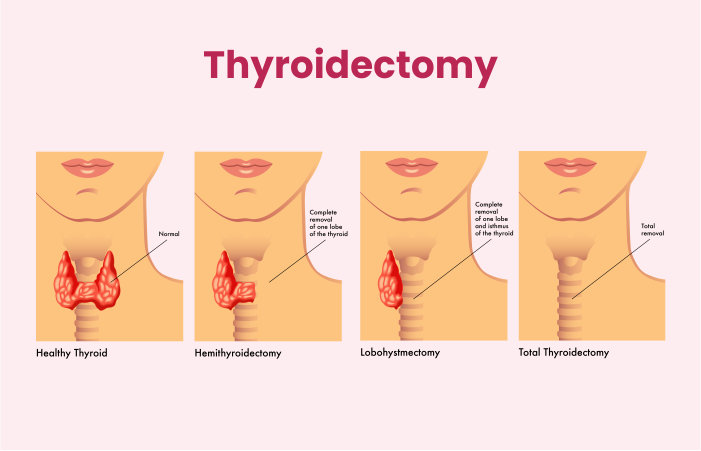Thyroidectomy Surgery in Hyderabad

Thyroidectomy Surgery
Welcome to TX Hospitals, the leading destination for thyroid surgeries and comprehensive thyroid care in Hyderabad. Our hospital is renowned for its exceptional medical expertise and state-of-the-art facilities, making us the top choice for patients seeking effective thyroidectomy treatment. With a team of highly skilled thyroid surgeons, we provide comprehensive care and ensure the best possible outcomes. In this article, we will provide you with valuable information about thyroidectomy surgery, including its purpose, why it is performed, how to prepare for the procedure, and the consequences of delaying the surgery.

What is Thyroidectomy Surgery?
Thyroidectomy surgery is a procedure performed to remove all or a part of the thyroid gland. The thyroid gland, located in the front of the neck, produces hormones that regulate various bodily functions. Thyroidectomy may be recommended for a variety of reasons, including thyroid cancer, benign thyroid nodules, hyperthyroidism, or an enlarged thyroid gland causing discomfort or difficulty breathing or swallowing.
Why is Thyroidectomy Surgery Performed?
Thyroidectomy surgery is performed for several reasons, including:
- Thyroid Cancer: If thyroid cancer is diagnosed, surgical removal of the thyroid gland may be recommended as part of the treatment plan.
- Benign Thyroid Nodules: Large or symptomatic benign nodules that cause difficulty in swallowing, breathing, or speaking may require thyroidectomy for relief.
- Hyperthyroidism: In cases where medication or other treatments fail to adequately control hyperthyroidism, surgical removal of the thyroid gland may be necessary.
How to Prepare for Thyroidectomy Surgery?
Preparing for thyroidectomy surgery involves several important steps to ensure a safe and successful procedure. Here are some aspects of the preparation process:
- Consultation and Evaluation: You will have a consultation with a thyroid surgeon at TX Hospitals who specializes in thyroidectomy surgery. They will evaluate your condition, discuss your symptoms and medical history, and explain the surgery in detail.
- Pre-operative Testing: Your healthcare team at TX Hospitals may conduct various tests, such as blood tests, imaging scans, or fine-needle aspiration biopsy, to assess the condition of your thyroid gland and ensure that you are medically fit for the surgery.
- Medication and Fasting: Your surgeon will provide specific instructions regarding any medications that need to be adjusted or discontinued before the surgery. You may also be required to fast for a certain period before the procedure.
More About Thyroidectomy Surgery at TX Hospitals
At TX Hospitals, we take pride in our team of highly skilled thyroid surgeons who specialize in thyroidectomy surgery. Our surgeons have extensive experience in performing various types of thyroidectomy procedures, including hemithyroidectomy, total thyroidectomy, and subtotal thyroidectomy. We prioritize patient safety and comfort, utilizing advanced surgical techniques and state-of-the-art equipment to achieve the best outcomes.
Consequences of Delaying Thyroidectomy Surgery
Delaying thyroidectomy surgery can have several consequences, including:
- Progression of Thyroid Conditions: Delaying surgery for thyroid cancer or other thyroid conditions can allow the disease to progress, potentially leading to complications or spreading to other parts of the body.
- Worsening Symptoms: For patients with symptomatic benign thyroid nodules or an enlarged thyroid gland, delaying surgery can result in persistent discomfort, difficulty swallowing, breathing difficulties, or voice changes.
- Increased Risk of Complications: In some cases, delaying thyroidectomy surgery can increase the risk of complications, especially if the condition worsens over time. This can make the surgery more complex and increase the likelihood of post-operative complications.
Don’t delay your treatment any further. Contact us at TX Hospitals to schedule a consultation with our esteemed thyroid surgeons. We are committed to providing you with the highest quality care and guiding you towards optimal thyroid health. Learn more about thyroidectomy surgery and experience the best outcomes at TX Hospitals, the trusted destination for thyroid surgeries in Hyderabad.
Frequently Asked Questions (FAQs)
The duration of thyroidectomy surgery can vary depending on the specific case and the extent of the surgery required. On average, the procedure takes around 2 to 3 hours.
In most cases, patients are required to stay in the hospital for a day or two following thyroidectomy surgery. However, the length of the hospital stay can vary depending on individual circumstances and the surgeon’s recommendation.
The recovery period after thyroidectomy surgery varies from patient to patient. Generally, it takes about 1 to 2 weeks to recover fully. During this time, patients may experience some discomfort, swelling, and temporary changes in voice. It is important to follow post-operative care instructions provided by your surgeon for a smooth recovery.
As with any surgical procedure, there are potential risks and complications associated with thyroidectomy surgery. These can include bleeding, infection, damage to surrounding structures, changes in voice, and low calcium levels. However, these risks are relatively rare and can be minimized with the expertise of a skilled thyroid surgeon.
The need for thyroid medication after thyroidectomy surgery depends on the extent of the surgery. If the entire thyroid gland is removed, lifelong thyroid hormone replacement medication will be necessary. However, if only a part of the thyroid is removed, your surgeon will determine whether medication is required based on your individual needs.
Yes, most patients can lead a normal and healthy life after thyroidectomy surgery. With proper medication and follow-up care, thyroid hormone levels can be effectively regulated, allowing individuals to maintain their energy levels and overall well-being.
Thyroidectomy surgery typically involves an incision in the lower neck, which may result in a visible scar. However, the scar tends to fade over time and can often be concealed by clothing or jewelry. Your surgeon will take measures to minimize scarring and provide guidance on scar care.









